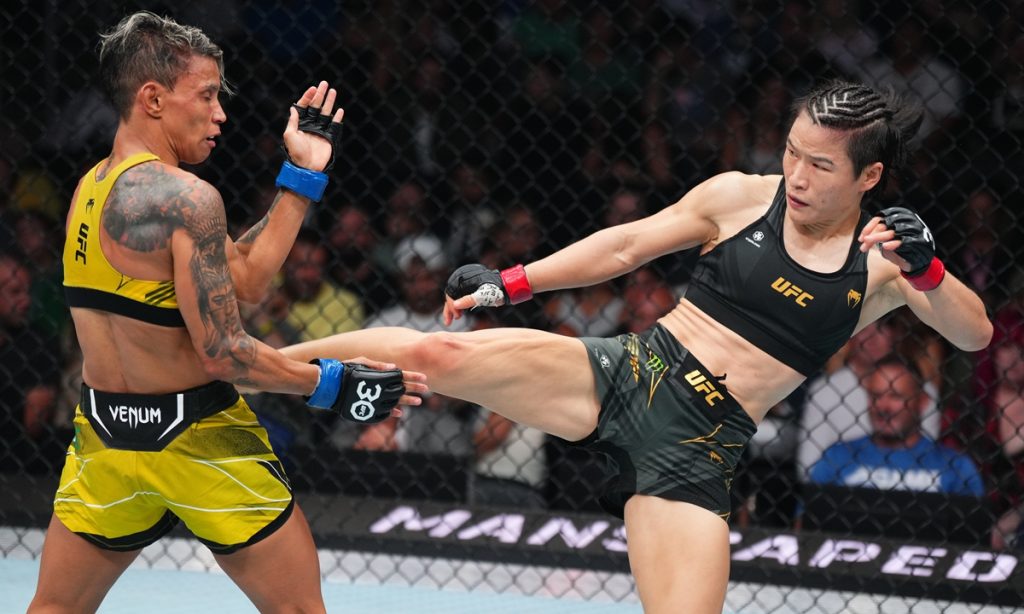Traditional Chinese adage boosts Zhang’s title defense

China's mixed martial arts (MMA) athlete Zhang Weili has once again proven that she's the best women's MMA strawweight fighter in the world with a unanimous decision win over Amanda Lemos in the co-main event at the UFC 292 on August 20.
Currently in Beijing after the fight, in which she defended her title for the first time since her second championship win, Zhang is now focused on blending Chinese culture into her future tactics.
Zhang applauded her opponent's tenacity, noting that credit is due to Lemos' persistence.
"There were a few times when I would see her eyes close when I was punching her, but later her eyes would open up again. I thought that her willpower was great," Zhang told the Global Times in an interview.
In Zhang's view, Lemos, known for her jiu-jitsu skills, is one of the most tenacious opponents she has encountered in recent years, and if the roles were reversed, she doubts she would have withstood such an onslaught of heavy punches.
"Nearly everyone thinks that I'm poor at ground skills, but I actually won the first 10 matches of my career on the ground," Zhang noted as her win came thanks to her overpowering ground-fighting skills, which involves hand-to-hand combat, against Lemos.
As far as the moniker "hexagon warrior" bestowed upon her by fans for her well-rounded skill set, Zhang considers as a humbling gesture.
"I'm yet to be a hexagon warrior but I'm trying my best to be one," Zhang said. "I think my skills, either ground skills or stand-up combat skills or agility, still need to be honed."
Tactic without tactics
She said the tactic employed against Lemos was to wrap around her "like water" and not give her too much space in any aspect. Using the "tactic without tactics" formula allows her better control of the situation.
The 34-year-old, who has dominated in nearly all of her matches outside of her two losses to Rose Namajunas of the US, has woven the tapestry of Chinese culture into her fighting approach beyond the octagon.
"Now I fight by using a tactic which does not involve any specific tactics," Zhang told the Global Times.
While on the face of it, Zhang's approach may appear strange, it is credited to the concept "Be water, my friend," famously coined by martial artist Bruce Lee, noting this philosophy guides her movements, emphasizing fluidity and adaptability in the face of adversity.
"I learned this concept at a very young age but it wasn't until recent years that I have developed a deeper understanding of what 'be water' means, which I can blend it into my tactics rather than previously trying to stick to one planned tactic," Zhang said.
She describes her fighting style as possessing both fluid and solid qualities, allowing her to be agile and efficient. Her use of traditional Chinese martial arts principles, such as the balance of yin, which means something of darkness, and yang, which means life and brightness, has given her a unique edge in the ring.
"I have benefited a lot from Chinese culture. I hope more people can learn from it and then improve themselves. It's more about studying and learning how to comprehend," she told the Global Times.
"It's important to learn from what the ancestors have left us, such as sincerity and modesty, and know how to be respectful and grateful," said Zhang.
Rose to fame
Born in Handan, a city in North China's Hebei Province, Zhang's formative years were characterized by discipline and dedication.
Zhang was introduced to martial arts at the age of 12. Little did they know that this early influence of modesty and discipline would set the stage for a remarkable athletic journey.
It was not common for girls to seriously pursue martial arts in China, but Zhang's passion burned brighter than the obstacles in her path. She trained diligently, determined to become a skilled fighter.
But it was her entry into the Ultimate Fighting Championship that truly catapulted her into the MMA spotlight.
Zhang's rise to prominence has not only made her a symbol of hope and empowerment for aspiring fighters in China but also a trailblazer in women's MMA globally. Her influence extends far beyond the ring, as she continues to inspire the next generation of fighters, both in China and around the world.
Zhang spent some time in 2022 learning tai chi from a master in her hometown.
"When I would use force while wrestling, it would always feel especially hard, but now with the idea of tai chi, everything is curved - there is rigidity and flexibility," Zhang said, noting that when incorporating Tai Chi into her training routine made her realize that wrestling also had soft qualities.
Zhang's winning form has also triggered an increasing number of young people participating in MMA in China.
It also gives pause to those who claim that championships are only built on the failures of many, which is antithetical to traditional Chinese culture's advocacy for securing victories through subduing opponents without fighting rather than an emphasis on the eventual victory.
"I don't think it is accurate to say that championships are based on the failures of many," Zhang told the Global Times.
"As long as you practice, at the very least, you will learn a lot from it," she said.